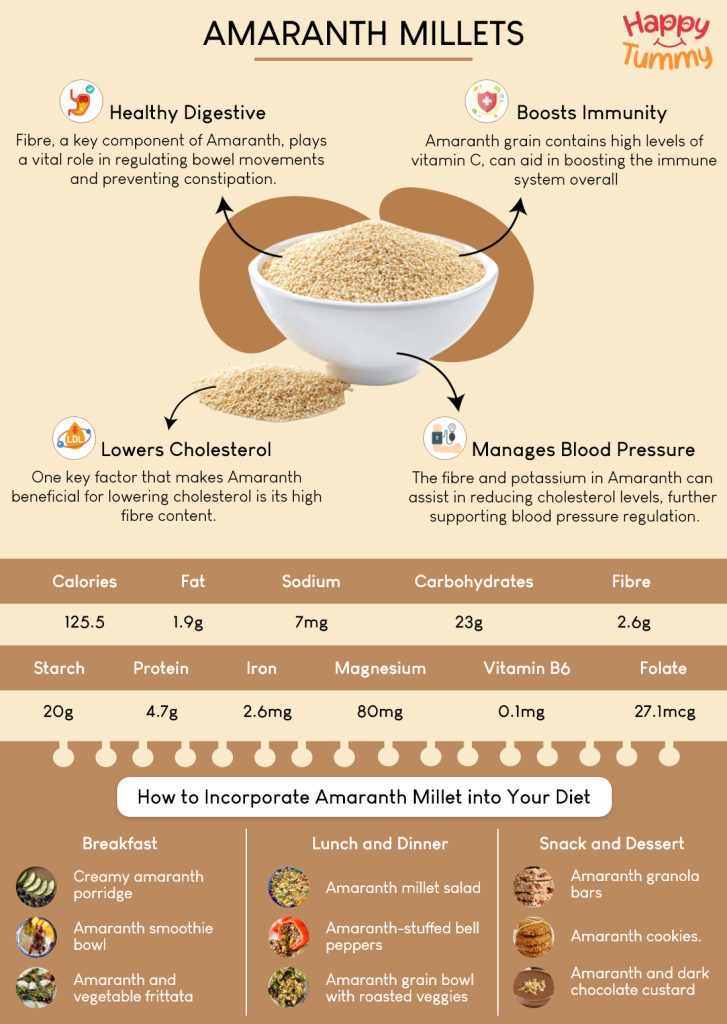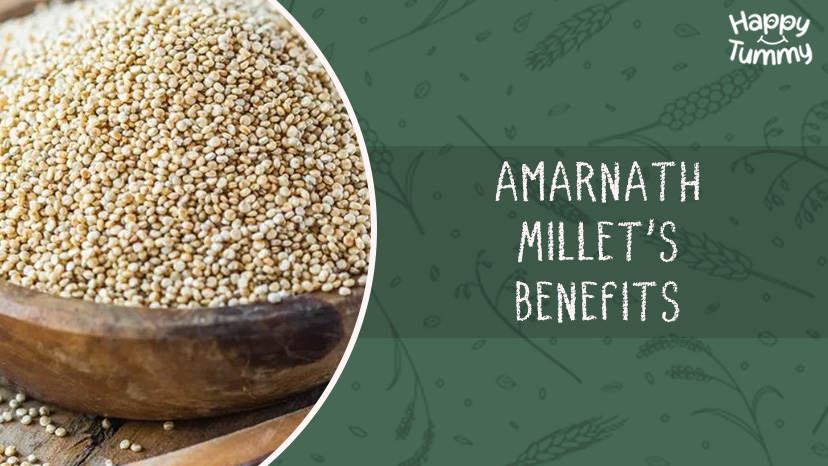Table of Contents
Once upon a time, in a land far, far away, amaranth millet was cultivated by the ancient Aztecs and Incas. These clever civilizations recognized the potential of this tiny grain way before it became trendy in the health food world.
They knew a good thing when they saw it. Amaranth millet was truly a superhero in their crop repertoire. But alas, as time passed, amaranth millet fell out of favour and was overshadowed by other grains.
People got caught up with quinoa and wheat, forgetting the unsung hero, Amaranth millet.
Luckily, amaranth millet made a comeback with the rise of the health food movement. People rediscovered the fantastic nutritional value and health benefits of this ancient grain.
It’s like the prodigal grain returning home to the dinner table. And now, here we are, enlightened individuals, appreciating the awesomeness of Amaranth millet.
It’s truly a grain worth celebrating for its rich history and incredible health benefits. So let’s dive in and discover why amaranth millet deserves a spot in our diets!
Nutritional Value of Amaranth Millet
To start with, let’s dig into the juicy details of why amaranth millet is not just another ordinary grain. It’s not your average Joe, folks.
This tiny powerhouse is packed with all the good stuff your body craves.
The USDA provides nutrition information for a half-cup serving (123g) of cooked Amaranth [1].
| Nutrient | Serving |
| Calories | 125.5 |
| Fat: | 1.9g |
| Sodium: | 7mg |
| Carbohydrates: | 23g |
| Fibre: | 2.6g |
| Starch: | 20g |
| Protein: | 4.7g |
| Iron: | 2.6mg |
| Magnesium: | 80mg |
| Vitamin B6: | 0.1mg |
| Folate: | 27.1mcg |
First up, let’s talk protein. Amaranth millet is loaded with it. We’re talking about a complete protein package right here. It contains all the essential amino acids your body needs to build and repair tissues.
So, all you gym enthusiasts out there, amaranth millet can be your new best friend. Without having to consume those uninteresting protein shakes, it will help you grow the muscle you’ve always wanted.
But wait, there’s more! This power grain is also packed with fibre. And not just any regular fibre; we’re talking about soluble and insoluble fibre.
Soluble fibre helps lower bad cholesterol levels, while insoluble fibre keeps your digestive system running like a well-oiled machine.
So say goodbye to those embarrassing moments of sudden bathroom breaks, and hello to smooth sailing digestion!
My Meal Plan
Perhaps you occasionally find it challenging to create a balanced meal plan and continuously seek new strategies to improve your fibre intake. Nevertheless, you are confused about what to do and who to consult.
But, don’t worry. The My Meal Plan test, created by Aashirvaad Atta with Multigrains and a group of knowledgeable nutritionists, reveals how much fibre you consume daily and gives you a detailed meal plan that conforms to the advised intake.
This implies that the destination of your quest for a balanced diet is only one click away.
Oh, did I mention the abundance of vitamins and minerals in Amaranth millets?
Because amaranth millet has got them in spades.
- It’s like a multivitamin in grain form.
- It’s bursting with iron, calcium, magnesium, potassium, and vitamin B-complex.
- It’s like a mini nutrient bomb in every bite.
So, if you want to keep your energy levels up and your bones strong, add Amaranth millet to your diet.
Health Benefits of Amaranth Millet

1. Amaranth Millet For Healthy Digestion
Fibre, a key component of Amaranth, plays a vital role in regulating bowel movements and preventing constipation.
Promoting the smooth movement of food through the digestive tract aids in maintaining regularity and preventing discomfort.
It is an excellent option for people with delicate digestive systems or dietary restrictions because it is easily digestible and pleasant on the stomach [2].
The unique makeup of Amaranth also supports a balanced and healthy gut flora by feeding the good bacteria in the gut.
A well-balanced gut flora is crucial for efficient digestion and nutrient absorption, ultimately supporting overall digestive health.
Digestive Quotient Test
On a journey of a Happy Tummy, we always get lost and confused about our digestive health.
Several questions pop up in our mind if we have good and healthy digestive health. Aashirvaad Atta with Multigrains, on the other hand, strives to make it easier to evaluate and improve the health of your digestive system by giving you the tools you need to start your journey toward a happier and more comfortable digestive experience.
You may quickly ascertain your digestion score on a scale of 100 by taking their Digestive Quotient test, created by qualified nutritionists.
This scorecard can help you make smart meal plans and monitor your progress toward a happy and healthy tummy.
2. Amaranth Millet For Boosting Immunity
Amaranth stands apart from other grains because it contains vitamin C, giving it an edge over other diets to boost the immune system.
This grain, which contains high levels of vitamin C, can aid in boosting the immune system overall because vitamin C increases the growth of white blood cells and is essential for creating collagen (provide support to strengthen bones and skin) [3].
3. Amaranth Millet For Lowering Cholesterol
One key factor that makes Amaranth beneficial for lowering cholesterol is its high fibre content.
The soluble fibre in Amaranth binds to LDL cholesterol, also known as “bad” cholesterol, and facilitates the body’s disposal of it. By doing this, it stops cholesterol from accumulating in the arteries [4].
You can maintain good cholesterol levels and promote heart health by combining it with a balanced diet and an active lifestyle.
4. Amaranth Millet For Managing Blood Pressure
Potassium plays a pivotal role in balancing the sodium levels in the body.
Potassium assists in relaxing blood vessel walls and lowering cardiovascular system stress by encouraging sodium excretion through urine.
This, in turn, aids in decreasing blood pressure. Amaranth also contains a lot of dietary fibre, which supports heart health [5].
The fibre in Amaranth can assist in reducing cholesterol levels, further supporting blood pressure regulation.
Also read –
Little Millet (Samai Rice) Benefits
Foxtail Millet(Kangni): Benefits and Nutrition
How to Incorporate Amaranth Millet into Your Diet
Amaranth millet’s adaptability makes it an excellent addition to various meals, satisfying both taste senses and health objectives.
The health advantages of amaranth millet are simply too good to pass up, whether you use it in salads, soups, or as a delicious side dish.
Okay, let’s explore the fascinating realm of adding amaranth millet to our diet! Prepare for an incredible culinary adventure to sate your appetite and energize your body.
1. Delicious Breakfast Ideas
Start your day with a bang by incorporating amaranth millet into your breakfast routine. How about some creamy amaranth porridge topped with fresh fruits and a drizzle of honey?
Or perhaps you’d prefer a hearty amaranth and vegetable frittata to kickstart your morning?
Don’t forget to sprinkle roasted amaranth seeds on your smoothie bowl or yogurt for that extra crunch!
2. Nutritious Lunch and Dinner Recipes
Moving on to lunch and dinner, there are endless possibilities to explore. Transform your salads by adding cooked amaranth millet, various fresh veggies, and a zesty dressing.
For a wholesome meal, whip up a delicious amaranth grain bowl with roasted veggies and your choice of protein. Craving some comfort food?
Try making amaranth pilaf with aromatic herbs and spices or amaranth-stuffed bell peppers for a burst of flavours!
3. Yummy Snack and Dessert Recipes
Snack time just got much more exciting! How about some crispy amaranth granola bars loaded with nuts and dried fruits?
Instead, prepare some delicious amaranth energy balls for a quick and wholesome pick-me-up throughout the day.
And for dessert, treat yourself to some delicious amaranth and dark chocolate custard or some tantalizing amaranth cookies. Your sweet tooth will thank you!
So, amaranth millet has you covered for breakfast, lunch, dinner, or snack time. It is ideal for any meal due to its adaptability and nutty flavour.
Utilize this superfood to exercise your culinary ideas and be inventive in the kitchen. Your body and taste buds will appreciate it!
Parting Wisdom
There you have it, folks! Amaranth Millet is truly a miraculous grain with a plethora of health benefits.
This little grain has everything wrapped up, from stimulating cognitive function to strengthening the immune system, encouraging weight loss, and benefiting digestive health.
Its high protein level, fibre-rich deliciousness, and plenty of vital vitamins and minerals give it a rich nutritional profile, making it a fantastic complement to any diet.
Bask in the glory of Amaranth millet’s nutritional value. It’s like nature’s way of saying, “Here you go, my little health warriors, feast on this golden grain of goodness!”
So embrace the awesomeness of amaranth millet and let it transform your health, one grain at a time.
Also read –
Millet vs Rice: Which is better?
Different Types of Millets you Must Know
Sorghum Millets (Jowar): Benefits and Nutrition
Frequently Asked Questions
The fact that it is a complete protein with anti-inflammatory and antioxidant properties accounts for its health advantages. Additionally, fibre-rich foods help to prevent stomach issues and heart disease. These factors make cooking it to include in your diet a wise decision.
Yes, you can use Amaranth flour as a gluten-free alternative in baking. However, it is often best used with other gluten-free flours like rice flour, tapioca flour, or almond flour to achieve better texture and consistency in baked goods.
Amaranth’s high fibre and protein content can promote a feeling of fullness and reduce overall calorie intake, potentially supporting weight management efforts.
In general, Amaranth is safe for consumption by most individuals. However, some people may have allergies or sensitivities like any food. It’s always advisable to consult with a healthcare professional or a registered dietician if you have specific health concerns or dietary restrictions.















